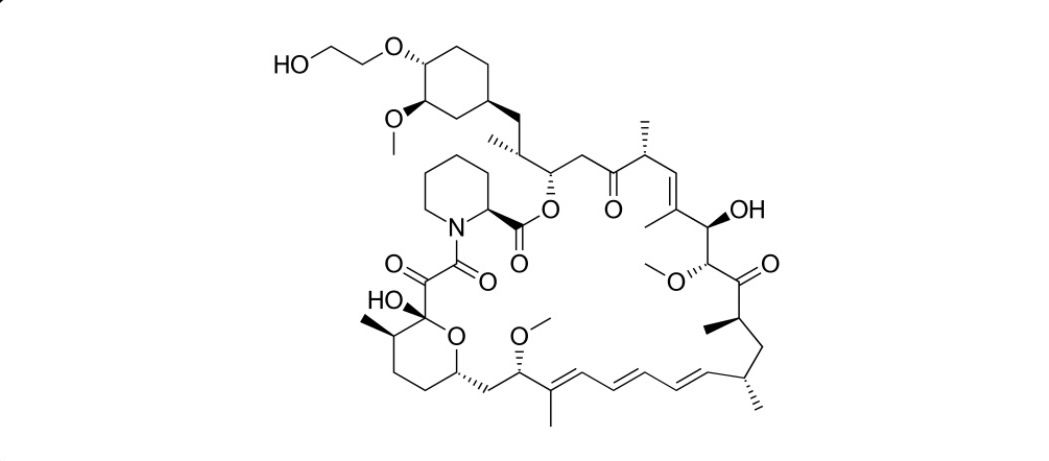Everolimus

Overview
Everolimus tablets, marketed as Afinitor, are oral inhibitors of the mammalian target of rapamycin (mTOR), a protein that regulates cell growth and proliferation. By targeting mTOR, everolimus disrupts the growth of cancer cells and modulates immune responses, making it effective in treating several malignancies and conditions associated with tuberous sclerosis complex. It is primarily used for hormone receptor-positive, HER2-negative breast cancer in combination with exemestane, progressive neuroendocrine tumors of pancreatic origin, advanced renal cell carcinoma in adults who have failed prior therapies, renal angiomyolipoma associated with tuberous sclerosis complex, and subependymal giant cell astrocytoma (SEGA) in patients not candidates for curative surgery.
Background and Date of Approval
Everolimus was first approved by the U.S. Food and Drug Administration (FDA) in 2009 for the treatment of advanced breast cancer. Subsequent approvals expanded its indications to include neuroendocrine tumors, renal cell carcinoma, and TSC-associated conditions. Its approval was based on clinical trials demonstrating efficacy in slowing disease progression, reducing tumor size, and improving patient outcomes while maintaining an acceptable safety profile. Everolimus represents a significant advancement in targeted cancer therapy and immunomodulation.
Uses
Everolimus tablets are indicated for adult patients with advanced hormone receptor-positive, HER2-negative breast cancer in combination with exemestane following failure of letrozole or anastrozole. It is also approved for progressive pancreatic neuroendocrine tumors that are unresectable or metastatic, advanced renal cell carcinoma after prior sunitinib or sorafenib treatment, renal angiomyolipoma associated with tuberous sclerosis complex in patients who do not require immediate surgery, and subependymal giant cell astrocytoma associated with TSC in patients unsuitable for surgical resection. Everolimus functions by inhibiting mTOR, thereby reducing cell proliferation and tumor growth.
Administration
Everolimus tablets are administered orally once daily, generally at a dose of 10 mg for most indications. For SEGA associated with TSC, dosing is adjusted according to body surface area to achieve a target trough concentration of 5–10 ng/mL. Patients should take the medication consistently at the same time each day with or without food. Dose modifications may be required in cases of hepatic impairment or when used with strong CYP3A4 inhibitors or inducers. Monitoring of drug levels and clinical response is recommended to ensure safe and effective therapy.
Side Effects
Common side effects of everolimus tablets include mouth ulcers, stomatitis, rash, diarrhea, fatigue, decreased appetite, nausea, vomiting, and increased susceptibility to infections. These effects are generally manageable and often improve with continued therapy. Regular monitoring and supportive care can help mitigate discomfort and ensure adherence to the treatment regimen.
Warnings
Serious adverse events associated with everolimus tablets include non-infectious pneumonitis, infections, renal failure, and laboratory abnormalities such as elevated serum creatinine, hyperglycemia, hyperlipidemia, and hematologic changes. Cases of fatal pneumonitis and severe infections have been reported. Patients must be monitored for these events, and prompt interventions, including dose adjustment or discontinuation, should be implemented as needed. Live vaccines should be avoided, and patients should be advised on infection precautions.
Precautions
Before starting everolimus therapy, a comprehensive medical assessment is essential, especially evaluating liver function, immune status, and renal function. Concomitant use of strong CYP3A4 inhibitors or inducers can significantly affect drug levels, requiring careful monitoring or dose adjustment. Regular laboratory assessments including blood counts, renal function, lipid profile, and blood glucose are recommended throughout treatment. Patients should inform healthcare providers about all medications and supplements they are taking to avoid potential drug interactions.
Expert Tips
Prescribers should educate patients about the potential side effects of everolimus tablets and the importance of adherence to the prescribed dosing schedule. Pharmacists should counsel patients on proper administration, handling, and storage. Regular follow-up visits are essential to monitor treatment efficacy, manage adverse events, and adjust therapy as needed. Collaboration among healthcare providers ensures optimal patient outcomes and safety.
